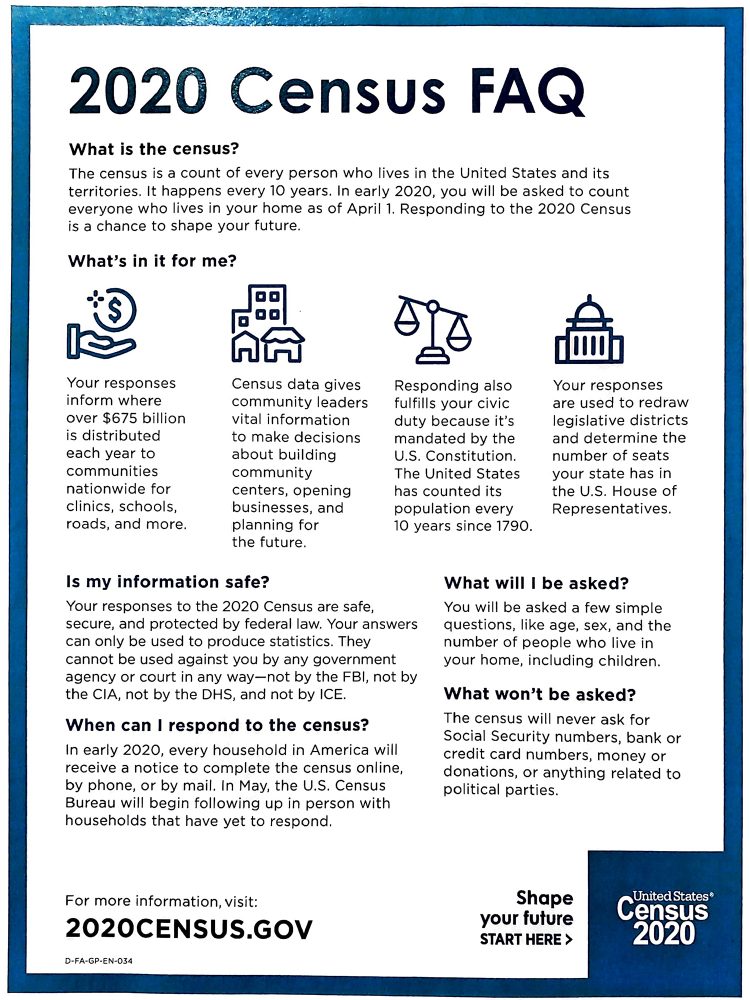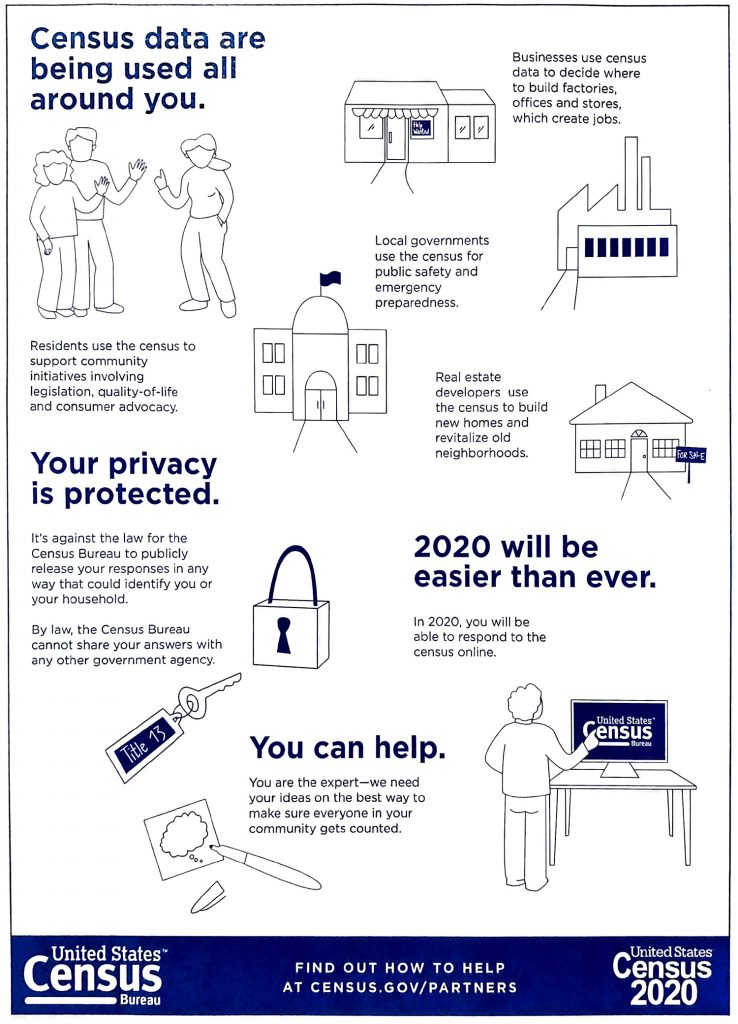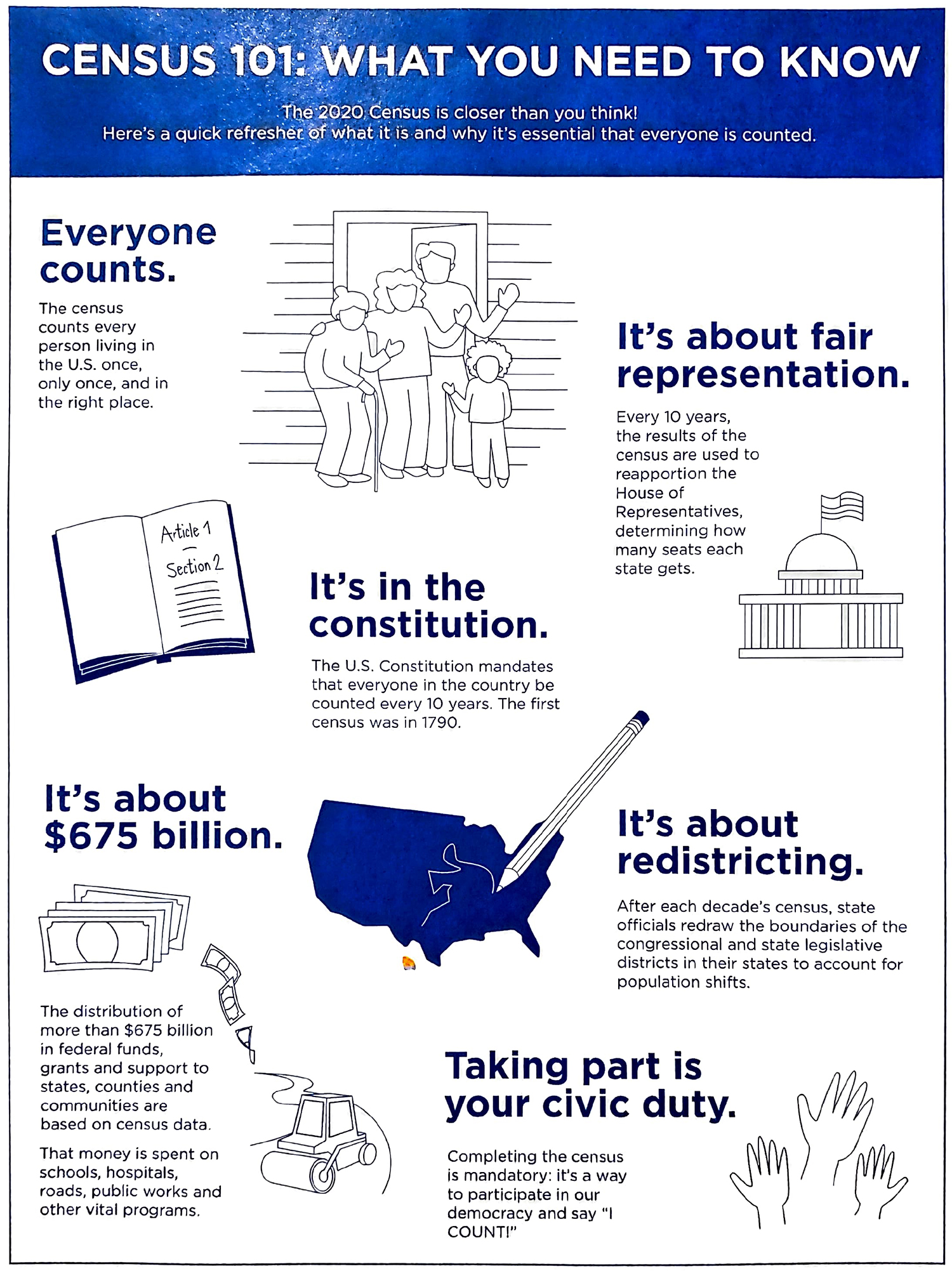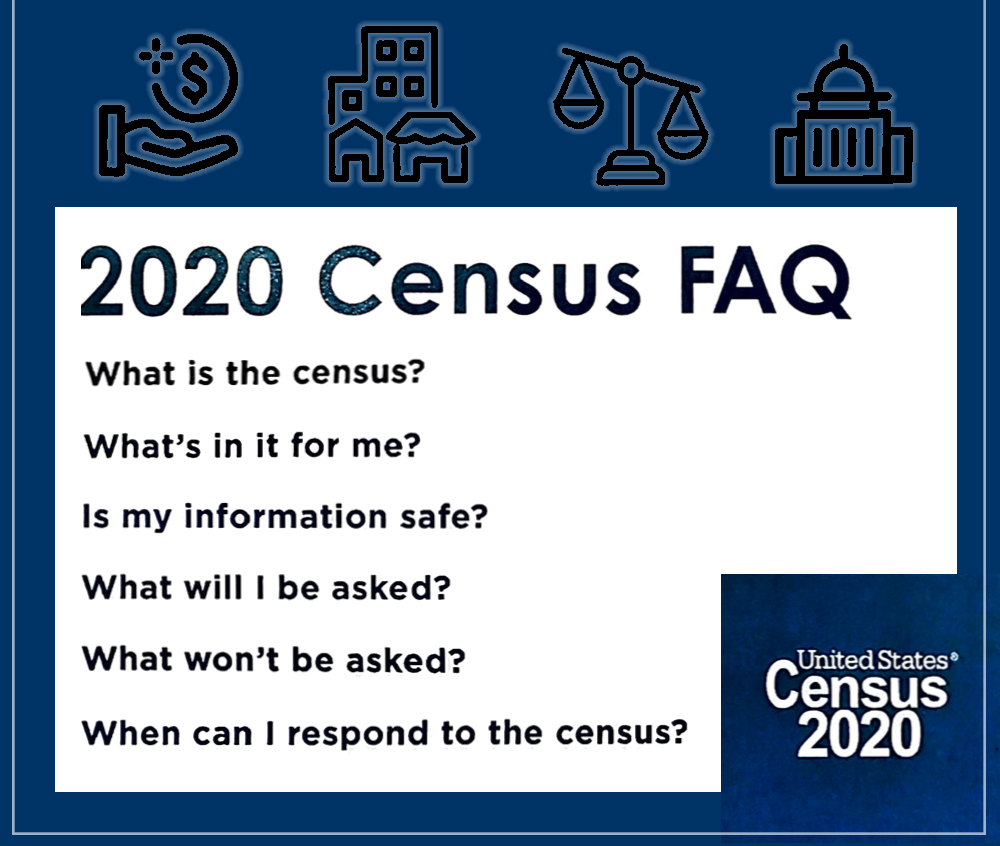
Take ten minutes and fill out your 2020 Census survey, to help our communities get the funding it needs.
Every 10 years, the U.S Census Bureau is required to count every person living in the United States. This is so the government can determine how to allocate over $675 billion in Federal funds to states and local communities over the next decade.
In mid-March, residents began receiving invitations to complete the 2020 Census. Take the invitation and respond for your home in one of three ways:
- By internet at My2020Census.gov
- By phone at 844-330-2020
- By mail with the form that was mailed to you
The census will NOT ask you for your Social Security number, money, or your bank information. Participation in the census takes about 10 minutes to complete.
BY INTERNET
1. Invitation. You will get an invitation with an identifier code for your home (Census ID, 12 letters and numbers).
2. Go online. Visit the U.S. Census webpage at My2020Census.gov.
3. Start session. Start your session by entering your Census ID. If you did not receive an ID in the mail or you lost it, please review step 5 below, or you can respond by phone or mail.
4. Respond. Once you have entered your Census ID, you may respond to the survey questions.
5. No Census ID? On the census webpage, once you have clicked “Start Questionnaire” and have been prompted to enter your Census ID, click at the bottom where it says “If you do not have a Census ID, click here.” This will allow you to begin the survey but with additional questions to verify
your address. After a few questions, you will complete the rest of the census survey.
6. Mistake? If you feel you have made a mistake on the form, you can return to the online survey and resubmit your information.
BY PHONE
1. If you want to answer by phone, call 844-330-2020. Phone lines are open every day from 6am to 1pm Central Time. For TDD (Telephone Display Device) support, call 844-467-2020.
2. A machine will give you various instructions on how to complete the survey.
3. In some circumstances, census workers will follow up with homes to ask questions about their responses. The goal is to ensure that no person is left out of the census or counted in more than one place.
4. All responses are kept confidential. The census caller will not ask for your financial information or Social Security number. They will only review the responses that you provide.
5. If you think you missed a call from the U.S. Census Bureau but want to confirm, call 844-330-2020 to speak with a local bureau representative.
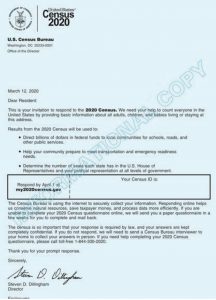
This is a sample of the
invitation letter homes will receive inviting them to respond to the 2020 U.S. Census. Most areas of the country will be invited to respond online. Areas less likely to respond online will receive a paper questionnaire with their invitation but can still choose to respond online.
WHO COUNTS?
» Count every person living or staying in your home on April 1,
regardless of their nationality or living situation, and no matter where they are from, what language they speak, or citizenship status.
» People without a permanent
residence who are staying temporarily with a friend or family member on April 1 should be counted at that address.
» If you are a renter, count yourself where you live. Don’t forget any family or roommates living there. Everyone needs to be counted.
» Count all children, including
babies, who usually live and sleep at your home. If they split time evenly between two households, count them where they are on April 1.
» College students not living in a
dorm should be counted at their off-campus address, even if they go to their parents’ home for school breaks.
» If you recently moved, count
yourself at your new address if you move by April 1.
» Service members who don’t live
in military barracks and aren’t deployed or stationed outside the U.S. should be counted where they live and sleep most of the time.
» Residents of a group facility:
the U.S. Census Bureau will work with representatives to ensure people living in college dorms, nursing homes, group homes, shelters, psychiatric facilities, correctional facilities, and military barracks are counted.
FREQUENTLY ASKED QUESTIONS
I need to complete the 2020 U.S. Census for someone else. How
do I respond? You may help if asked, or if you are a legal guardian or executor. Answer the questions the way the person living at that address would.
Should I still count grandchildren living with me if their parents
do not live or stay here? Yes. All children, including babies, should
be counted at their usual residence, even if their parents do not live and sleep at the same address. The usual residence is where the child lives and sleeps most of the time. If you are not sure, count them at the address of the place where the child was staying on April 1, 2020.
Does the census count the children of roommates, housemates,
roomers, or tenants? Yes, the children of roommates, housemates, roomers, and tenants should be counted at their usual residence. This means where the children live and sleep most of the time. If you are not sure, count them at the address of the place where they were staying on April 1, 2020.
Why am I being asked about my neighbor’s address? If the U.S.
Census Bureau cannot contact someone about an address, it may ask their neighbors for assistance. During each census, some homes that appear vacant actually have people living there. Verifying whether a home is vacant helps count everyone.
Does the 2020 U.S. Census survey ask about citizenship status? NO.
The census survey does not ask whether you or anyone in your home is a U.S. citizen.
Are non-citizens counted in the census? YES. Everyone counts. The
2020 U.S. Census counts everyone living in the country, including non-citizens. Learn more about who should be counted when you complete the 2020 U.S. Census at 2020census.gov/am-i-required.
Can my answers be shared with law enforcement or used against
me? NO. The law prevents the U.S. Census Bureau from sharing your
information with law enforcement. Your answers cannot be used to
impact your eligibility for government benefits. Your answers are only used to learn about our country. The U.S. Census Bureau is bound by Title 13 of the U.S. Code to protect your personal information and keep it strictly confidential. That means every answer to every question.
Can we only respond to the census via the internet? NO. You can respond to the census via the internet, over the phone in 13 languages, and by mail.
BE AWARE OF SCAMS. The U.S. Census Bureau will never ask you for:
– Your Social Security number
– Money or donations
– Anything on behalf of a political party
– Your bank or credit card account numbers
If someone claiming to be from the U.S. Census Bureau contacts you
via email or phone and asks you for one of these things, it’s a scam and you should not cooperate. For more information, visit Avoiding Fraud and Scams at 2020census.gov/avoiding-fraud.
QUESTIONS ASKED ON THE FORM
1. How many people were living or staying in this house, apartment, or mobile home on April 1, 2020?
Here, you’ll count everyone living and sleeping in your home most of the time, including young children,
roommates, and friends and family members who are living with you, even temporarily.
2. Were there any additional people staying here on April 1, 2020, that you did not include in Question
1? Mark all that apply: Children, related or unrelated, such as newborn babies, grandchildren, or foster children; relatives, such as adult children, cousins, or in-laws; nonrelatives, such as roommates or live-in babysitters, and people staying here temporarily.
3. Is this house, apartment, or mobile home (mark ONE box). Owned by you or someone in this household with a mortgage or loan? Include home equity loans. Is it owned by you or someone in this household free and clear (without a mortgage or loan)? Rented? Occupied without payment of rent? The bureau uses responses to this question to gather information about homeownership and renting.
4. What is your telephone number? The U.S. Census Bureau asks for your phone number in case there are any questions about your census form. The bureau will only contact you for official census business, if needed.
5. What is Person 1’s name? If there is someone living here who pays the rent or owns the residence, start by listing him or her as Person 1. If the owner or the person who pays the rent does not live here, start by listing any adult living there as Person 1. There will be opportunities to list the names of additional members of your household.
6. What is Person 1’s sex? Mark ONE box: male or female. This allows the bureau to gather information about males and females, which can be used in planning and funding government programs. This data can also be used to enforce laws, regulations, and policies against discrimination.
7. What is Person 1’s age and what is Person 1’s date of birth? Note: Person 1’s age as of April 1, 2020. For babies less than one year old, do not write the age in months, write 0 as the age.
8. Is Person 1 of Hispanic, Latino, or Spanish origin? NOTE: Please answer both Question 8 about Hispanic origin and Question 9 about race. For this census, Hispanic origin is not race. Hispanic origin can be viewed as the heritage, nationality, lineage, or country of birth of the person or the person’s parents or ancestors before arriving in the U.S. People who identify as Hispanic, Latino, or Spanish may be any race.
9. What is Person 1’s race? Mark one or more boxes AND print origins: White; Black or African American; American Indian or Alaska Native; Chinese; Filipino; Asian Indian; Vietnamese; Korean; Japanese; other Asian; Native Hawaiian; Samoan; Chamorro; other Pacific Islander; some other race.
10. Print name of Person 2. Here, you will list the next person in your household.
11. Does this person usually live or stay somewhere else? Mark all that apply: no; yes, for college; yes, for a military assignment; yes, for a job or business; yes, in a nursing home; yes, with a parent or other relative; yes, at a seasonal or second residence; yes, in a jail or prison; yes, for another reason. How is this person related to Person 1? Mark ONE box; opposite-sex husband/wife/spouse; opposite-sex unmarried partner;
same-sex husband/wife/spouse; same-sex unmarried partner; biological son or daughter; adopted son or daughter; stepson or stepdaughter; brother or sister; father or mother; grandchild; parent-in-law; son-in-law or daughter-in-law; other relative; roommate or housemate; foster child; other nonrelative.
For more information or to see an example of the form with the questions visit:
2020census.gov/about-questions
If you need assistance responding to the census, please contact:
- English / Español – Arkansas United: (479) 347-2824
- Marshallese – Arkansas Coalition of Marshallese: (479) 365-6625
- A Burmese/Karen language guide is available at bit.ly/burmese-census
See the flyers below to get more information and you can also visit 2020census.gov. Find answers about what you will and won’t be asked, the safety of your information and more.



